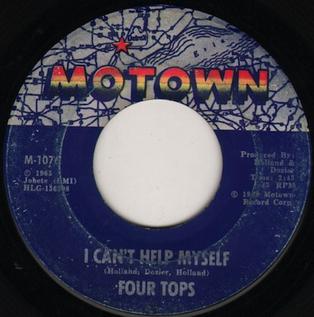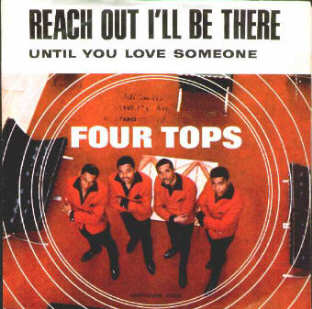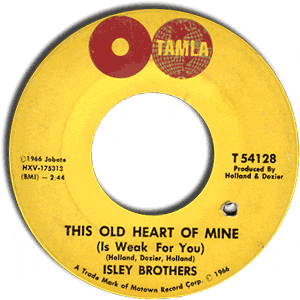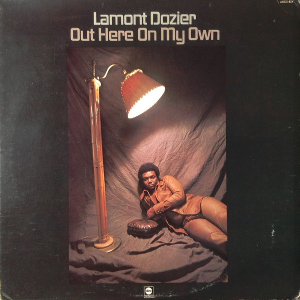Related Research Articles

Lamont Herbert Dozier was an American singer, songwriter, and record producer from Detroit. He co-wrote and produced 14 US Billboard number-one hits and four number ones in the UK.

"Stop! In the Name of Love" is a 1965 song recorded by the Supremes for the Motown label.

"I Hear a Symphony" is a 1965 song recorded by the Supremes for the Motown label.

"You Keep Me Hangin' On" is a song written and composed by Holland–Dozier–Holland. It was first recorded in 1966 by American Motown group the Supremes, reaching number one on the Billboard Hot 100. American rock band Vanilla Fudge released a cover version in June the following year, which reached number six on the Billboard Hot 100. Wilson Pickett recorded it in 1969. English singer Kim Wilde covered "You Keep Me Hangin' On" in 1986, reaching number one on the Billboard Hot 100 in June 1987. In the first 32 years of the Billboard Hot 100 rock era, "You Keep Me Hangin' On" became one of the six songs to reach number one by two different musical acts. In 1996, American country singer Reba McEntire's version reached number two on the US Billboard Hot Dance Club Play chart. The BBC ranked the Supremes' original song at number 78 on The Top 100 Digital Motown Chart, which ranks Motown releases by their all-time UK downloads and streams.

"I Can't Help Myself" is a 1965 song recorded by the Four Tops for the Motown label.

"Baby I Need Your Loving" is a 1964 hit single recorded by the Four Tops for the Motown label. Written and produced by Motown's main production team Holland–Dozier–Holland, the song was the group's first Motown single and their first pop Top 20 hit, making it to number 11 on the US Billboard Hot 100 and number four in Canada in the fall of 1964. It was also their first million-selling hit single.

"Reach Out I'll Be There" (also formatted as "Reach Out (I'll Be There)") is a song recorded by the Four Tops from their fourth studio album Reach Out (1967). Written and produced by Motown's main production team, Holland–Dozier–Holland, the song is one of the most widely-known Motown hits of the 1960s and is today considered the Four Tops' signature song.

Richard Dean Taylor was a Canadian musician, most notable as a singer, songwriter, and record producer for Motown during the 1960s and 1970s. According to Jason Ankeny, Taylor was "one of the most underrated acts ever to record under the Motown aegis."

"This Old Heart of Mine (Is Weak for You)" is a Holland–Dozier–Holland song that was a hit for American musical group the Isley Brothers in January 1966 during their brief tenure on Motown's Tamla label. Featuring Ronald Isley on lead vocal, "This Old Heart of Mine" peaked at number twelve on the Billboard Hot 100, and at number six on the Billboard R&B Singles chart.

"Love Is Here and Now You're Gone" is a 1967 song recorded by the Supremes for the Motown label.

"When a Man Loves a Woman" is a song written by Calvin Lewis and Andrew Wright and first recorded by Percy Sledge in 1966 at Norala Sound Studio in Sheffield, Alabama. It made number one on both the Billboard Hot 100 and R&B singles charts. Country singer John Wesley Ryles had a minor hit with his version of the song in 1976 while singer and actress Bette Midler recorded the song 14 years later and had a Top 40 hit with her version in 1990. In 1991, Michael Bolton recorded the song and his version peaked at number one on both the Billboard Hot 100 chart and the Billboard Adult Contemporary Singles chart.

"Heat Wave" is a 1963 song written by the Holland–Dozier–Holland songwriting team. It was first made popular by the Motown vocal group Martha and the Vandellas. Released as a 45 rpm single on July 9, 1963, on the Motown subsidiary Gordy label, it hit number one on the Billboard Hot R&B chart—where it stayed for four weeks—and peaking at number 4 on the Billboard Hot 100.

"My World Is Empty Without You" is a 1965 song recorded and released as a single by the Supremes for the Motown label.

"The Happening" is a 1967 song recorded by Motown artists The Supremes. It served as the theme song of the 1967 Columbia Pictures film The Happening, and was released as a single by Motown at the time of the film's release that spring. While the movie flopped, the song peaked at number 1 on the Billboard Hot 100 pop singles chart in May, becoming The Supremes' tenth number 1 single in the United States, peaking in the top 10 on the UK Singles Chart at number 6, and in the top 5 in the Australian Pop Chart and in the Dutch Pop Chart.

"Forever Came Today" is a 1968 song written and produced by the Motown collective of Holland–Dozier–Holland, and was first made into a hit as a single for Diana Ross & the Supremes in early 1968. A disco version of the song was released as a single seven years later by Motown group the Jackson 5.

"Take Me in Your Arms (Rock Me a Little While)" is a song written by the premier Motown songwriting/production team of the 1960s Holland–Dozier–Holland. The first hit recording was sung by Kim Weston in 1965. It was most popular in 1975 when it was recorded by the Doobie Brothers.

"When the Lovelight Starts Shining Through His Eyes" is a song written by Holland–Dozier–Holland and recorded in 1963 by Motown singing group The Supremes. It is notable as the Supremes' first Billboard Hot 100 Top 40 recording, following seven previous singles between January 1961 and September 1963 which failed to enter the Top 40. The single is also notable as the first Supremes single written and produced by Holland–Dozier–Holland, who had previously created hits for Martha and the Vandellas and Mary Wells.

"Where Did Our Love Go" is a 1964 song recorded by American music group the Supremes for the Motown label.

"How Sweet It Is (To Be Loved by You)" is a song recorded by American soul singer Marvin Gaye from his fifth studio album of the same name (1965). It was written in 1964 by the Motown songwriting team of Holland–Dozier–Holland, and produced by Brian Holland and Lamont Dozier. The song title was inspired by one of the actor and comedian Jackie Gleason's signature phrases, "How Sweet It Is!"

Out Here on My Own is the debut studio album by singer Lamont Dozier released on the ABC label.
References
- 1 2 Pollock, Bruce (2013). Rock Song Index (2nd Revised ed.). p. 380. ISBN 9781135462963 – via Google Books.
- ↑ "Lamont Dozier, "Trying to Hold on to My Woman" Chart Positions" . Retrieved April 8, 2019.
- ↑ "Lamont Dozier, "Trying to Hold on to My Woman" Single Release" . Retrieved April 8, 2019.
- ↑ "Top Pop Singles" (PDF). Billboard. New York, New York: Billboard Publications, Inc. December 28, 1974. Retrieved April 8, 2019.
- ↑ "Top RPM Singles: Issue 4988a." RPM . Library and Archives Canada.
- ↑ "Lamont Dozier Chart History (Hot 100)". Billboard.
- ↑ "Lamont Dozier Chart History (Hot R&B/Hip-Hop Songs)". Billboard.